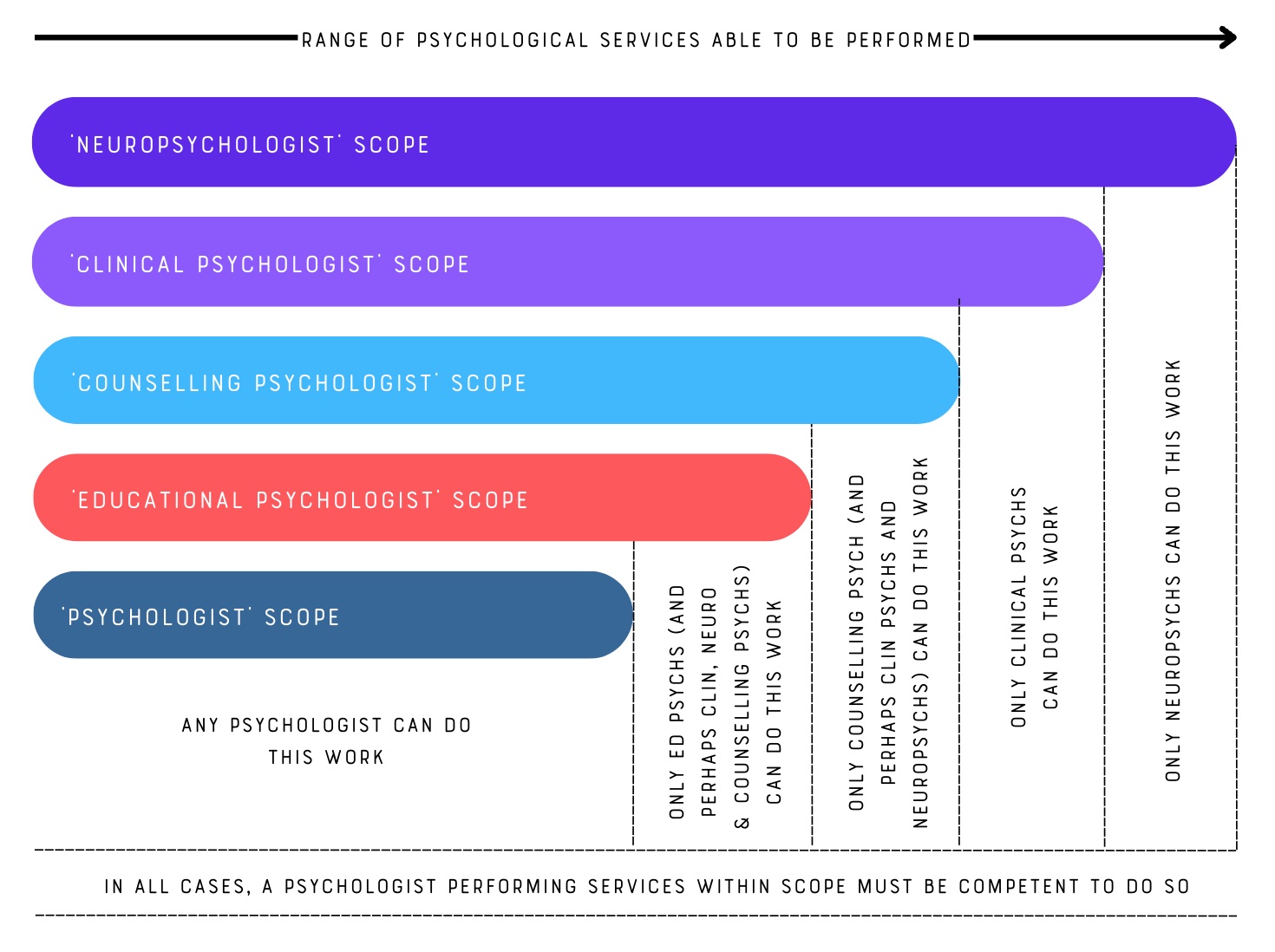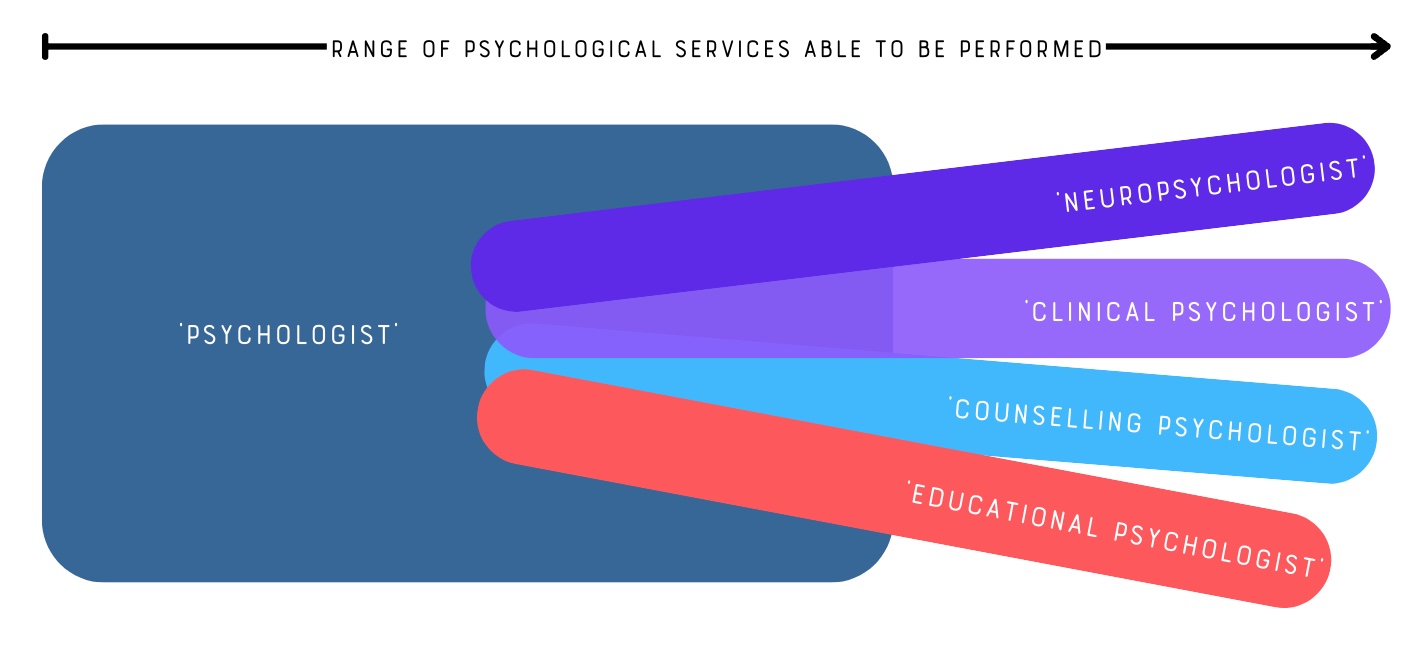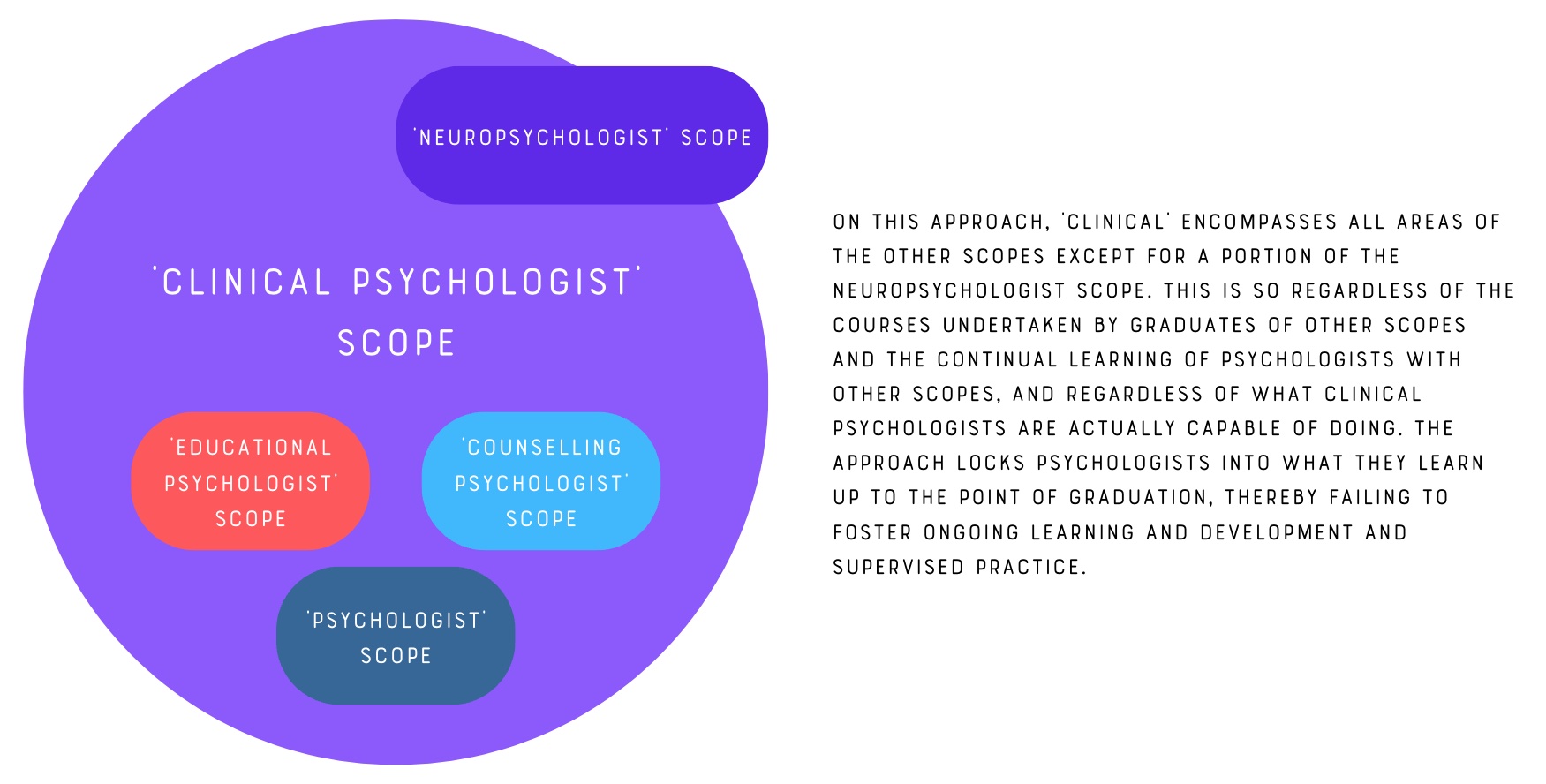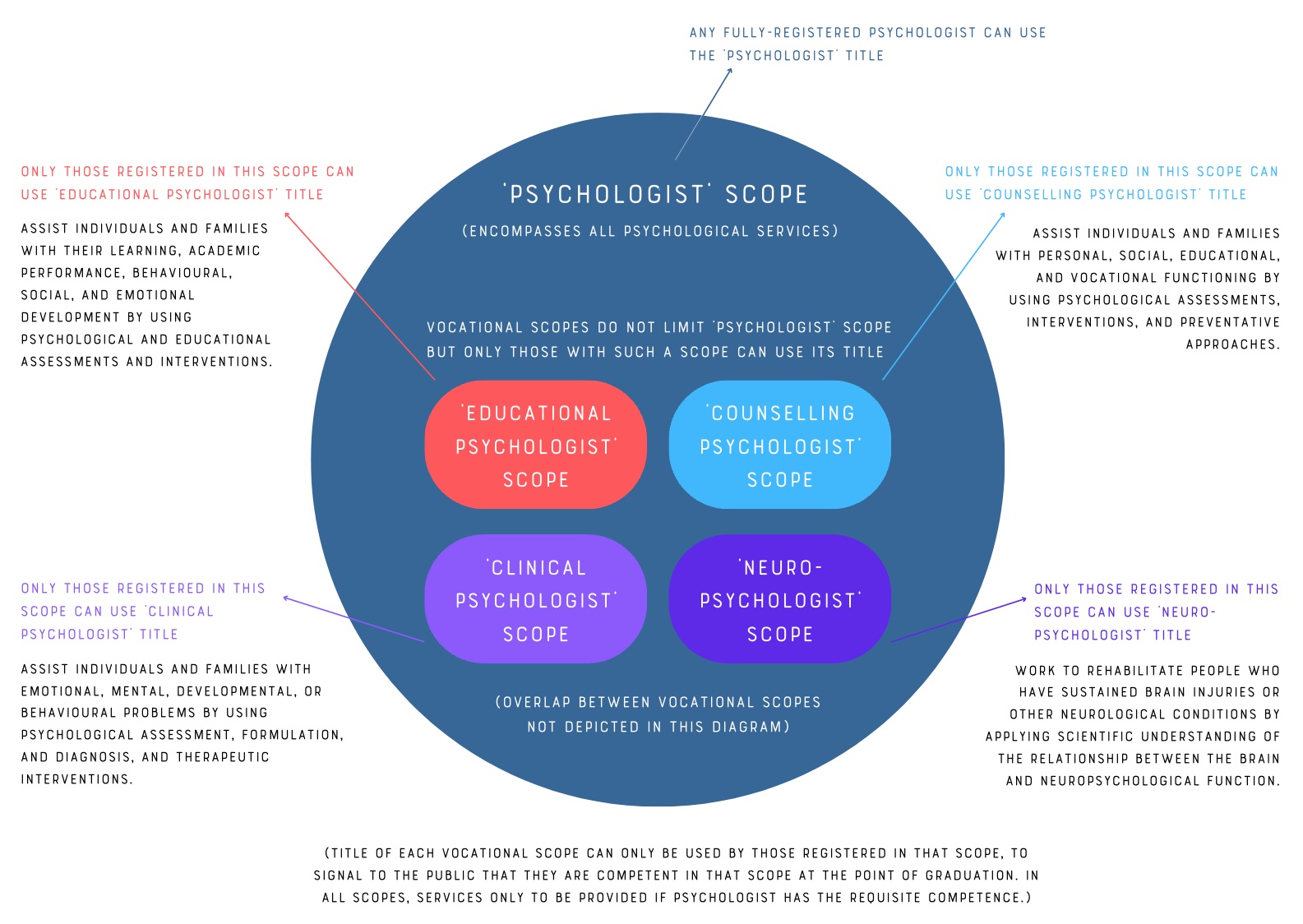The Board has approached the consultation like this: there have been no changes to the scopes of practice, but previously the Board was wrong in how it applied the scopes, with its ‘historic comments’ resulting in many psychologists exceeding their scope of practice, so the Board is going to rectify matters and ‘legally enable’ the workforce, but in the meantime the status quo remains, i.e., individual practitioners need to take responsibility for determining whether they are competent to undertake specific psychology services. We respectfully believe that the Board’s approach is misleading people as to the nature, breadth, and longevity of the Board’s ‘historic comments’, and perpetuating and exacerbating misrepresentations as to the nature and breadth of the current scopes of practice. Given the way in which the Board has approached and structured the consultation, we believe the Board’s erroneous view of the current scopes of practice means that the entire consultation proposal rests on an incorrect foundation.
More...
Introduction
We believe there are substantial problems with the Board’s consultation paper of 6 December 2023 that go to the heart of the lawfulness and procedural fairness of the entire consultation process. The Board has been informed of these problems. On this page, and for the moment, we focus only on why we believe:
- what the Board has been saying in 2023 is incorrect; and
- the consultation process and consultation paper rest on an incorrect foundation.
We address both of these points in the context of discussing the consultation paper itself, because some of what the Board has been saying in 2023 relating to scopes of practice forms the basis for the approach the Board has taken to the consultation.
If you are reading this page but have not yet read The scopes from 2004-2021, and What the Board is saying now, we recommend that you read those first. In a nutshell, though, the analysis below involves a comparison of what the Board did and said from 2004-2021, as against what it is saying now:
The scopes from 2004-2021 | What the Board is saying now |
|---|---|
From 2004-2021 the Board was clear that the general 'Psychologist' scope of practice is all-encompassing and that a vocational scope of practice does not “fence off” any exclusive territory other than title use. "Any psychologist", the Board said, "can perform any activity, as long as they are demonstrably competent to do so, or are doing so under appropriate supervision". | In statements at a roadshow, to a government agency and concerned psychologists, and in its consultation paper, the currently-composed Board is saying the Board's approach from 2004-2021 was wrong and contrary to the Health Practitioners Competence Assurance Act. It is saying many psychologists are acting outside their scope of practice and that it needs to 'rectify' this by changing the scopes framework. |
The consultation paper and proposed scopes framework rest on an incorrect foundation
Board’s approach
The approach of the consultation paper can be summed up as follows:
- the Board says “there have been no changes to any of the scopes of practice”;
but
- “[h]istorically, the Board made comments about scopes of practice that risked being construed as contradicting the fundamental principle that health practitioners must not practise outside their scope of practice. The Board had stated on its website that scopes of practice protect title but do not limit tasks, provided the individual psychologist is competent to perform those tasks”;
however
- the “legal position is set out in section 8 of the Act”, namely (as paraphrased by the Board), “no health practitioner may perform part of a health service that forms part of a scope of practice of the profession in which they are registered unless they are permitted to perform that service by the scope of practice in which they are registered”;
and so (it is clearly implied)
- the Board as previously constituted was wrong in how it said the scopes are to be applied;
with the result that
- many psychologists, in reliance on the historical comments, have expanded their practice beyond the scope of practice in which they are registered and may have been practising outside of scope;
and so
- ‘we propose XYZ to rectify the matter and legally enable the workforce’;
but
- “[p]ending the conclusion of the consultation process and formal Board decisions, the status quo remains, this means that individual practitioners need to take responsibility for determining whether they are competent to undertake specific psychology services”.
To summarise this into a single sentence, the Board is saying: there have been no changes to the scopes of practice, but previously the Board was wrong in how it applied the scopes, resulting in many psychologists exceeding their scope of practice, so the Board is going to rectify matters and ‘legally enable’ the workforce, but in the meantime the status quo remains, i.e., individual practitioners need to take responsibility for determining whether they are competent to undertake specific psychology services.
Misleading
We believe the Board’s approach is:
- misleading people as to the nature, breadth, and longevity of the Board’s ‘historic comments’; and
- perpetuating and exacerbating misrepresentations as to the nature and breadth of the current scopes of practice.
‘Historic comments’
Referring to the position that the Board held consistently from 2004 to 2021 as ‘historic comments’ is misleading. During this period, the Board was consistently clear about the following:
- The general ‘Psychologist’ scope of practice was intended to be, and was written to be, all-encompassing, and the Board went to significant lengths to explain that a vocational scope of practice does not “fence off” any exclusive territory (other than title use).
- “Any psychologist”, the Board said, “can perform any activity, as long as they are demonstrably competent to do so, or are doing so under appropriate supervision (for example when training in a new area of practice). A vocational scope simply provides the practitioner with the right to use the scope’s title, and thereby clearly and simply signal to the public (or an employer) their competence in that scope. In short, practice is not restricted by scope, but by competence. Only title use is restricted by scope. All psychologists are ethically and legally bound to practise only within the bounds of their competence.”
- The “operational policy on scopes has not included any restriction on practise imposed on those without that scope. Any restrictions arise from the limits of a practitioner’s competence.”
It is clear from the second consultation paper on the original scopes of practice in December 2003 that the Board was taking this approach, the scopes were gazetted on that basis in 2004, and the Board made wide-ranging communications confirming the position through to 2021, in its newsletters and annual reports, in its own and in Ministerial consultation processes, and on its website.
The Board’s wide-ranging communications through to 2021 are described in the pages you can find at The scopes from 2004-2021.
The Board was entitled to take the approach it did to scopes from 2004-2021
The Board was perfectly entitled to take this approach when developing the original scopes, and doing so was not inconsistent with or contrary to the Health Practitioners Competence Assurance Act 2003.
Not understanding why can lead to error
To appreciate why the Board took the approach it did, and why it was entitled to do so, it is important to understand what happened when the Health Practitioners Competence Assurance Act 2003 came into force, how the Board in 2004 intended the scopes to apply, and how this slotted into the framework of the Act.
Without that understanding, a person could fall into the error of thinking the Board’s approach was not consistent with the Act’s approach to scopes (which is what the current members of the Board appear to have done).
The reasons why the Board did not, from 2004-2021, act inconsistently with the Act are explained below.
Legislative context
Four key sections
In 2003-2004 when developing the original scopes of practice, the Board was working within four key sections of the Act:
- section 3(1) (Purpose of Act) which describes the Act’s principal purpose as being “to protect the health and safety of members of the public by providing for mechanisms to ensure that health practitioners are competent and fit to practise their professions”;
- section 7(1)-(2) (Unqualified person must not claim to be health practitioner), under which:
- a person may only use names, words, titles, initials, abbreviations, or descriptions stating or implying that the person is a health practitioner of a particular kind if the person is registered, and is qualified to be registered, as a health practitioner of that kind; and
- no person may claim to be practising a profession as a health practitioner of a particular kind … unless the person is a health practitioner of that kind, and holds a current practising certificate as a health practitioner of that kind;
- section 8(2) (Health practitioners must not practise outside scope of practice), under which no health practitioner may perform a health service that forms part of a scope of practice of the profession in which they are registered unless they are permitted to perform that service by their scope of practice and performs that service in accordance with any conditions stated in his or her scope of practice; and
- section 11 (Authorities must specify scopes of practice), under which the Board was required to describe the contents of the profession in 1 or more scopes of practice, and under which the Board was able to describe each scope of practice “in any way the authority thinks fit”.
Transition requirements
At the same time, the Board also needed to accommodate the transition of psychologists previously registered under the Psychologists Act 1981 (under which there were no scopes, and registered psychologists could practice in any area as long as they were competent) to a scope of practice under the 2003 Act. On this point, the Board needed to work with sections 189-190 of the 2003 Act. Under section 189 of the 2003 Act, persons registered under the Psychologists Act 1981 were deemed to be registered under the new Act, and under section 190 of the new Act, the Psychologists Board was “deemed to have authorised the practitioner’s scope of practice”. That scope of practice was deemed to consist of:
- health services of the kind that the practitioner was permitted to perform by virtue of their registration under the 1981 Act; and
- any conditions that had been imposed by or under the 1981 Act on the practitioner’s registration or annual practising certificate or annual licence.
Board needed to accommodate all pre-existing psychological services
In the absence of legislative scopes under the 1981 Act, the Board needed to have a scope in place that accommodated all pre-existing psychological services. The approach the Board ultimately took was to say that all psychologists registered under the 1981 Act were deemed to be registered in the ‘Psychologist’ scope of practice (it had abandoned its earlier notion of a ‘Transitional’ scope of practice). Whilst the Board developed two vocational scopes that psychologists could apply to be registered in if they wished (‘Clinical Psychologist’ and ‘Educational Psychologist’), those two scopes did not detract from the breadth of the ‘Psychologist’ scope, and they could not do so given that, on 18 September 2004 when most of the new Act came into force and the Psychologists Act 1981 was repealed, all pre-existing registered psychologists were deemed to be registered in the ‘Psychologists’ scope.
All initial scopes were gazetted on 15 September 2004 and came into effect on 18 September 2004. If the vocational scopes were to have had the effect of carving areas of practice out from the general ‘Psychologists’ scope, that would have left a lacuna in coverage of the ‘Psychologists’ scope for anyone who, from 18 September, was practising in an area covered by the vocational scopes but who had not yet been able to be registered in those vocational scopes. That was never the intention, and it explains why the Board has always said (until recent statements by the currently composed Board) that the ‘Psychologist’ scope was all-encompassing.
The analysis above has explained why the vocational scopes did not ‘carve off’ or ‘fence off’ exclusive areas of practice. It is also important to appreciate that, with the ‘Psychologist’ scope being all-encompassing, vocational scopes could not extend the range of permitted psychological services either. Vocational scopes neither restricted the general scope nor did they add to it in terms of areas of services capable of being performed. Their role was left to limiting the use of their titles to those registered with them, on the premise that those with the scope had, at post-graduate level graduation, undertaken the minimum training required to practise in areas covered by the scopes. The purpose of that was to give confidence to people requiring psychological services in an area covered by a scope that, when graduating, a person with that scope could hit the ground running. That did not, however, prevent any other registered psychologist from acquiring the requisite competence (e.g., through supervised practice and/or additional training) and practising in an area covered by a vocational scope.
How the Board’s approach from 2004-2021 slots into the Act
When the intended and required all-encompassing nature of the general ‘Psychologist’ scope is properly understood and it is understood that all fully registered practitioners have or are deemed to have it, it becomes apparent that the Board’s statements from 2004 to 2021 were entirely consistent with this approach and the provisions of the Act. Importantly, this understanding of the scopes is consistent with sections 8 and 7 of the Act:
- under section 8, all psychologists under all scopes are entitled to provide any psychological services provided they have the requisite competence/expertise; but
- under section 7(1), a psychologist may only use the title of a vocational scope if they are registered in that scope. To track the wording of the section, a person may only use the title stating that the person is a psychologist of a particular kind (i.e., ‘Clinical Psychologist’ or ‘Educational Psychologist’) if that person is registered as a psychologist of that kind. Similarly, under section 7(2), no person may claim to be practising as a psychologist of a particular kind (i.e., with that specific title) unless the person is a psychologist of that kind, and holds a current practising certificate as a health practitioner of that kind.
It is critical that the Board and psychologists understand the above analysis
It is of fundamental importance for the currently composed Board and psychologists to understand the above analysis which explains the Board’s approach to scopes of practice from 2004 to 2021. When the above analysis is understood, statements like this by the Board between 2005-2021 make perfect sense:
A vocational scope of practice does not “fence off” any exclusive territory (other than title use). Any psychologist can perform any activity, as long as they are demonstrably competent to do so, or are doing so under appropriate supervision (for example when training in a new area of practice). A vocational scope simply provides the practitioner with the right to use the scope’s title, and thereby clearly and simply signal to the public (or an employer) their competence in that scope.
In short, practice is not restricted by scope, but by competence. Only title use is restricted by scope. All psychologists are ethically and legally bound to practise only within the bounds of their competence.
Diagrammatic explanation
For some people, the analysis above is more readily understood when what the Board is saying now, versus what it did and said from 2004-2021, is shown diagrammatically.
Incorrect positions
Broadly speaking, it seems clear that the current members of the Board are trying to paint the current scopes in one of three ways, that is, along either these lines:

or these lines:

or perhaps even these lines:

but all of these are factually and legally incorrect. The Board is also saying that many psychologists have expanded their practice beyond the scope of practice in which they are registered and may have been practising outside of scope. In substance, the Board is saying any such psychologist is acting contrary to section 8 and therefore unlawfully. This is incorrect and not consistent with how the Board developed the scopes of practice and applied them from 2004 to 2021.
Correct position
The Board’s current position is incorrect because the analysis above makes it clear that the scopes of practice have, since 2004 (and later in the case of the counselling and neuropsychologist scopes) been like this:

As noted above, when the scopes of practice as developed and consistently applied from 2004 to around 2021 are properly understood in this way, the Board’s messaging from 2004 to 2021 makes perfect sense and is consistent with the Act. The Board chose a particular way of protecting the public, through the use of titles for particular areas of practice, that did not involve the curtailing of what any fully registered psychologist with appropriately acquired competence/expertise could do. Indeed, the requirement to have the requisite expertise is baked into the wording of every gazetted scope of practice (“practice is undertaken within an individual’s area and level of expertise”).
Consultation and proposed framework rest on an erroneous foundation
The Board’s approach to the consultation in the manner described earlier means the entire process, including the consultation paper and the proposed framework for scopes of practice, rests on the erroneous foundation that the existing scopes are narrower than the Board actually intended, lawfully promulgated, and explained clearly from 2004 to 2021, and are – to extents not clearly explained by the Board – siloed, with the consequence that some psychologists have been practising outside their scope of practice.
Board’s approach misleading profession and others
The Board’s approach in the current consultation document is misleading the profession, government agencies, employers, and the public as to what the current scopes permit, and it is wrongly asserting publicly that “many psychologists have expanded their practice beyond the scope of practice in which they are registered”, with the consequence that this “means that some psychologists may possibly have been practising outside their scope of practice”.
Purported ‘rectification’
The Board says it is “committed to taking steps to rectify the matter… without restricting the livelihoods, or punishing those psychologists who have competently developed their practice over the years”, suggesting that legally speaking those psychologists might be susceptible to punishment for exceeding their scope. Later in the paper the Board refers to:
- “legal enablement of the existing workforce” (paragraph 11);
- “ensur[ing] that all psychologists are practising lawfully” (paragraph 20);
- its belief that the proposed approach is “the best way to ‘set to rights’ the current situation” (paragraph 21); and
- the proposed transition process leading to “[l]egal validity to and backing for [psychologists’] current range of practice” (paragraph 21).
For the reasons explained above, these statements are highly problematic. The Board is relying on its erroneous view of the scopes of practice to justify changing the scopes framework, and it is essentially defaming or impugning a sizeable number of psychologists and potentially bringing the wider profession into disrepute. It also creates a range of significant risks for a number of government agency employers of psychologists.
Given the Board’s erroneous view of the scopes of practice, what the Board is doing is not ‘rectification’ or ‘legal enablement’ or ‘setting to rights’, but undermining the current scopes framework on which psychologists have relied since 2004 and it is being done through the consultation paper in a manner that is not transparent.
Flawed problem definition
The Board’s erroneous view of the scopes of practice means that the entire consultation proposal rests on this erroneous view. Statements like “taking steps to rectify the matter”, “our considerations in searching for a solution”, and “the best way to ‘set to rights’ the current situation”, reveal that the Board is proposing a solution to a problem that does not actually exist. The problem definition is flawed and completely undermines the purpose and integrity of the consultation process.
